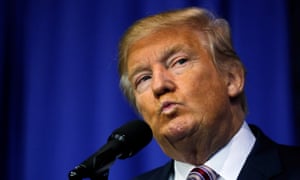Trump's media war threatens journalists globally, protection group warns
Committee to Protect Journalists says president is sending a signal to countries such as Turkey, Ethiopia and Venezuela that ‘it is OK to abuse journalists’ Donald Trump has declared the mainstream media the ‘enemy of the people’, and blocked several outlets from attending a recent press briefing. Photograph: Jonathan Ernst/Reuters
Donald Trump has declared the mainstream media the ‘enemy of the people’, and blocked several outlets from attending a recent press briefing. Photograph: Jonathan Ernst/ReutersThe Trump administration should “act as a champion of press freedom”, a senior member of the Committee to Protect Journalists (CPJ) said on Saturday, rather than prosecute a war with mainstream US media that could “send a signal to other countries that it is OK to verbally abuse journalists and undermine their credibility”.
Rob Mahoney, deputy executive director of the CPJ, a nonprofit that promotes press freedom worldwide, told the Guardian Trump’s attacks on the press do not “help our work trying to deal with countries like Turkey, Ethiopia or Venezuela, where you have governments who want to nothing more than to silence and intimidate the press.”
Mahoney also said attempts to favour conservative press outlets and declare the mainstream media the “enemy of the American people”looked like a deliberate effort by the White House to “inoculate itself from criticism”.
“Any time the press now uncovers an scandal or wrongdoing the administration can dismiss it as false,” he said.
On Friday, the administration blocked a number of media outlets, including the New York Times, CNN and the Guardian, from an off-camera briefing with press secretary Sean Spicer.
Spicer later said the White House planned to “aggressively push back” against the press. “We’re just not going to sit back and let false narratives, false stories, inaccurate facts get out there,” he said.
On Friday night, Trump kept up his attack, using Twitter to say: “FAKE NEWS media knowingly doesn’t tell the truth. A great danger to our country. The failing @nytimes has become a joke. Likewise @CNN. Sad!”
Within the press, reaction was furious. New York Times editor Dean Baquet said “nothing like this has ever happened at the White House in our long history of covering multiple administrations”.
Lee Glendinning, editor of Guardian US, said: “This is a deeply troubling and divisive act. Holding power to account is an essential part of the democratic process, and that’s exactly what the Guardian will continue to do.”
The White House Correspondents Association (WHCA) attempted to play down the issue, noting the administration was still providing near-daily briefings.
“I don’t think that people should rush to judgment to suggest that this is the start of a big crackdown on media access,” WHCA president Jeff Mason told the New York Times.
Nonetheless, the episode came a day after senior Trump adviser Steve Bannon, in an appearance at the conservative CPAC event in Maryland, denounced the “corporatist, globalist media”, which he said was “adamantly opposed to an economic nationalist agenda” and “always wrong” about the administration.
“Every day there is going to be a fight,” Bannon said.
Rather, 85, added: “These are the dangers presidents are supposed to protect against, not create. For all who excused Mr Trump’s rhetoric in the campaign as just talk, the reckoning has come. I hope it isn’t true, but I fear Mr Trump is nearing or perhaps already beyond any hope of redemption.”
Opposing the mainstream media plays well with Trump’s base. Mahoney said it also serves the administration’s aim to protect itself against legitimate criticism.
“If you go back to the early 1970s and the terrible relations between Nixon and the press,” he said, “it was nonetheless allowed to do its job, and we got Watergate.”
Suzanne Nossel, executive director of PEN America, said in a statement the White House was doing “a grave disservice to the American people”.
“The president’s worries over probing questions and damaging revelations cannot outweigh his duty to allow the American people to gain the information and insight they deserve,” she added.
Several organisations, including the Washington Post, are developing Trump-focused investigative units, which will likely rely on anonymously sourced stories. Trump has attacked the practice of quoting anonymous sources, while chief of staff Reince Priebus called on the media to “stop with this unnamed source stuff”.
The president, however, has left himself open to charges of hypocrisy. In the 1980s and 1990s, he regularly spoke to the press under aliases, in order to promote himself.
Moves to choose which outlets are briefed by the administration also conflicted with remarks made by Spicer as recently as December, when he said media outlets should not be stopped from covering the White House.
The dispute is carrying over into areas where detente is usually observed, for example the annual White House Correspondents’ Dinner. The 29 April event has been plagued by withdrawals. The New York Times has not attended since 2008; the Guardian will not attend this year. Buzzfeed reported this week that CNN may not attend either.
The news service owned by former New York mayor Michael Bloomberg, who is reportedly backing a prominent pro-immigration campaign, is pulling out of hosting an afterparty. Vanity Fair and the New Yorker have said they will not host parties either.
Geen opmerkingen:
Een reactie posten
Opmerking: Alleen leden van deze blog kunnen een reactie posten.